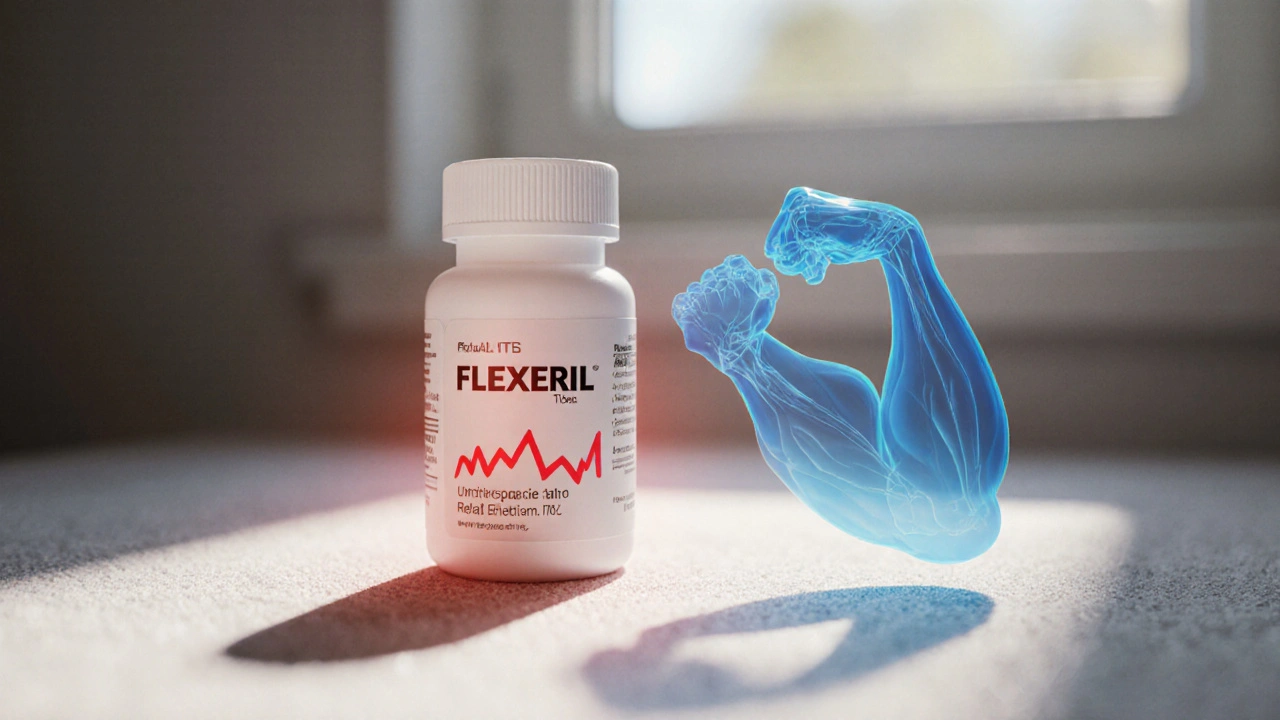Muscle Relaxant Selector
Select your key concerns to find the most suitable muscle relaxant alternative.
How do you respond to sedation?
Do you have heart or liver conditions?
Is this for chronic spasticity?
Concern about dependence?
Select your preferences to see personalized recommendations
Muscle Relaxant Comparison
| Generic | Best For | Sedation | Risk Factors |
|---|---|---|---|
| Cyclobenzaprine | Acute spasms, short-term use | Moderate-High | Anticholinergic effects, QT interval |
| Methocarbamol | Low sedation needs | Low-Moderate | Flushing, headache |
| Tizanidine | Chronic spasticity (MS, spinal injuries) | High | Hypotension, liver issues |
| Baclofen | Chronic spasticity (spinal injuries) | Moderate | Weakness, nausea |
| Metaxalone | Older adults, low sedation | Low-Moderate | Stomach upset |
Ever wondered if there’s a better pill than the one your doctor prescribed for a stubborn muscle spasm? Flexeril has been the go‑to for many, but a handful of other muscle relaxants can offer a smoother ride or fewer side effects. This guide walks you through the most common alternatives, line‑by‑line, so you can spot the right fit for your body and lifestyle.
What is Flexeril (Cyclobenzaprine)?
Cyclobenzaprine is a prescription muscle relaxant that works by blocking nerve impulses (pain signals) sent to the brain. Marketed under the brand name Flexeril, it’s typically prescribed for short‑term relief of muscle spasms associated with acute musculoskeletal conditions.
Typical dosing starts at 5mg three times a day, climbing to 10mg if tolerated. The drug kicks in within 30‑60 minutes, peaks around 3‑4 hours, and hangs around for 12‑18 hours thanks to a half‑life of roughly 18hours. Common side effects include drowsiness, dry mouth, and occasional dizziness.
Because it’s a tricyclic‑derived compound, Cyclobenzaprine can interact with antidepressants, antihistamines, and other sedatives, so a quick chat with your pharmacist is a smart move.
Why Look for Alternatives?
Not everyone vibes with Flexeril’s profile. Some folks experience excessive sedation, others can’t handle the anticholinergic dry‑mouth effect, and a few have underlying heart conditions that make the drug’s slight QT‑interval impact risky. If any of those ring a bell, it’s worth checking the lineup below.
Top Muscle‑Relaxant Alternatives
Here’s a quick snapshot of the most prescribed options, each highlighted with its key traits.
| Generic | Brand | Typical Dose | Onset | Half‑Life | Common Side Effects | Sedation Level | Best For |
|---|---|---|---|---|---|---|---|
| Cyclobenzaprine | Flexeril | 5‑10mg PO TID | 30‑60min | 18hrs | Drowsiness, dry mouth, dizziness | Moderate‑High | Acute spasms, short‑term use |
| Methocarbamol | Robaxin | 500‑1500mg PO QID | 45‑60min | 6‑12hrs | Drowsiness, flushing, headache | Low‑Moderate | Patients needing less sedation |
| Tizanidine | Zanaflex | 2‑4mg PO BID (max 36mg/day) | 15‑30min | 2.5‑3.5hrs | Drowsiness, hypotension, dry mouth | High | Spasticity from MS or spinal injuries |
| Baclofen | Lioresal | 5‑10mg PO TID | 30‑60min | 2‑4hrs | Drowsiness, weakness, nausea | Moderate | Chronic spasticity, especially spinal cord injury |
| Carisoprodol | Soma | 250‑350mg PO TID‑QID | 30‑60min | 1‑2hrs (active metabolite) | Drowsiness, dependence risk, headache | High | Short‑term relief when other agents fail |
| Orphenadrine | Norflex | 100‑150mg PO QID | 45‑60min | 12‑16hrs | Dizziness, anticholinergic effects, dry mouth | Moderate‑High | Patients with tension‑type muscle pain |
| Metaxalone | Skelaxin | 400‑800mg PO BID | 1‑2hrs | 9‑13hrs | Drowsiness, upset stomach, nausea | Low‑Moderate | Gentle alternative for older adults |
How to Choose the Right Option
Picking a muscle relaxant isn’t a one‑size‑fits‑all decision. Below are four quick questions you can answer to narrow the field.
- How sensitive are you to sedation? If you drive or operate machinery, a low‑sedation drug like Methocarbamol or Metaxalone might be safer.
- Do you have heart or liver concerns? Cyclobenzaprine’s anticholinergic load can stress the heart, while Tizanidine is cleared by the liver and may need dose adjustments in hepatic impairment.
- Is chronic spasticity part of your picture? For long‑term conditions like multiple sclerosis, Baclofen or Tizanidine are often preferred because they target neural pathways more directly.
- Are you worried about dependence? Carisoprodol carries a higher abuse potential, so it’s usually reserved for brief, supervised courses.
Answering these helps you and your prescriber weigh benefits against drawbacks without guessing.
Practical Tips for Using Muscle Relaxants Safely
- Start at the lowest effective dose and titrate up only if needed.
- Take the medication with food if stomach upset occurs.
- Avoid alcohol and other CNS depressants unless your doctor says it’s okay.
- Report any new heart rhythm changes, severe dizziness, or urinary retention.
- Don’t mix multiple muscle relaxants; the combined sedation can be dangerous.

When Non‑Drug Options Make Sense
Sometimes the best alternative isn’t a pill at all. Physical therapy, gentle stretching, heat packs, and short‑term NSAIDs can relieve tension without the side‑effect baggage. A combined approach-drug for the first 48‑72hours, then taper to PT-often yields the longest‑lasting relief.
Bottom Line: No One‑Size‑Fit‑All
Flexeril works well for many, but you have a menu of choices. If drowsiness knocks you out of work, Methocarbamol or Metaxalone can keep you alert. If you need a strong spasm‑buster for a spinal injury, Baclofen or Tizanidine may be the answer. Talk openly with your doctor, bring this chart, and pick the one that matches your lifestyle and health profile.
Frequently Asked Questions
Can I take Flexeril and a sleep aid together?
Mixing Flexeril with other central nervous system depressants-like prescription sleep aids, antihistamines, or alcohol-can increase drowsiness and impair coordination. Always check with your prescriber before combining them.
Is Cyclobenzaprine safe for seniors?
Seniors often experience stronger anticholinergic effects (dry mouth, confusion, urinary retention). Lower starting doses (5mg) and close monitoring are recommended. In many cases, a milder agent like Metaxalone is preferred.
How long should I stay on a muscle relaxant?
Most guidelines suggest a short course-usually 2‑3 weeks-because benefits plateau and side‑effects accumulate. For chronic conditions, doctors may prescribe a maintenance dose of a less sedating option under strict supervision.
Can I switch from Flexeril to another muscle relaxant?
Yes, but tapering is wise to avoid withdrawal or rebound spasm. Your doctor can design a cross‑taper schedule-e.g., gradually reduce Cyclobenzaprine while introducing a low dose of Methocarbamol.
Are there any natural alternatives?
Herbal options like turmeric or magnesium can support muscle health, but they lack the rapid spasm‑relief power of prescription agents. Pairing them with physiotherapy often yields the best overall outcome.


Author
Mike Clayton
As a pharmaceutical expert, I am passionate about researching and developing new medications to improve people's lives. With my extensive knowledge in the field, I enjoy writing articles and sharing insights on various diseases and their treatments. My goal is to educate the public on the importance of understanding the medications they take and how they can contribute to their overall well-being. I am constantly striving to stay up-to-date with the latest advancements in pharmaceuticals and share that knowledge with others. Through my writing, I hope to bridge the gap between science and the general public, making complex topics more accessible and easy to understand.